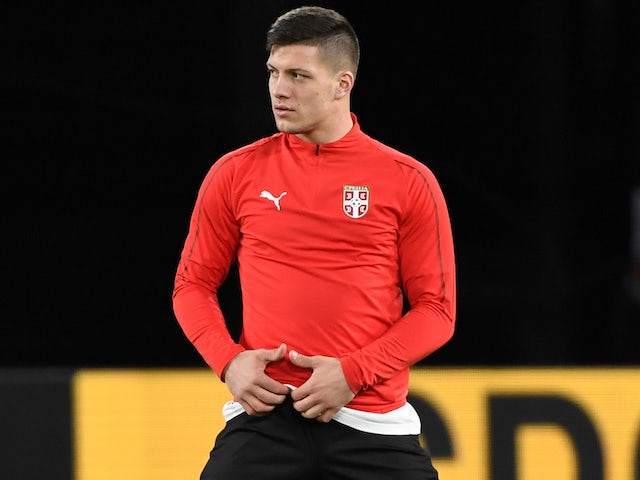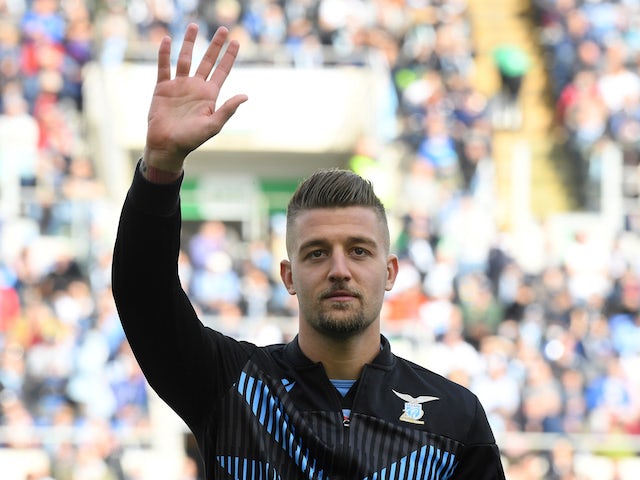Russia and Serbia begin their UEFA Nations League campaign with a Group B3 fixture in Moscow on Thursday evening.
These two teams are joined by Turkey and Hungary, with only the victors securing promotion to Group A for 2022-23.
Match preview
 © Reuters
© Reuters
After 10 months without a fixture on the international scene, Russia and Serbia will welcome the opportunity to get back onto the pitch as they resume their preparations for Euro 2020.
Although they will have ambitions to make headway in this competition, making an impact in the 24-nation tournament next summer will remain the focus of Stanislav Cherchesov and Ljubisa Tumbakovic.
During the inaugural Nations League, Russia competed in a group which also included Sweden and Turkey, only missing out on promotion by a solitary goal.
Meanwhile, Serbia came through their six fixtures against Romania, Montenegro and Lithuania with four wins and two draws, a return which proved enough to top their group by two points.
While it is Serbia who are the newcomers to section B, few people will be backing against the Eagles making it back-to-back promotions, especially when they are motivated to build some momentum ahead of their Euro 2020 playoff against Norway next month.
Tumbakovic will be hoping that the next two games prove beneficial to Luka Jovic, who endured a dismal first 12 months at Real Madrid after his big-money switch from Eintracht Frankfurt.
From Russia's perspective, there will be a desire to maintain the form which saw them qualify for next year's major tournament with relative ease, only losing out in their games against Belgium.
In the middle of their qualification campaign, they recorded seven successive victories, overcoming tests in the form of Scotland, Kazakhstan and Cyprus.
Cherchesov now has the job of managing the transition of his squad, which features 10 players who are 31 or older and seven players who have earned one cap or fewer.
Russia form (all competitions): WWWWLW
Serbia form (all competitions): LWWWWD
Team News
 © Reuters
© Reuters
Given the 10-month break, it is unclear how each manager will choose to line up for their first fixture of the year.
With regards to Russia, each of the 11 players who featured in the 4-1 defeat against Belgium late in 2019 are in the squad.
Cherchesov is unlikely to make many alterations to that side, although 37-year-old Yuri Zhirkov may find his place on the left flank at risk.
Having only been named as a substitute in the last game, Sergej Milinkovic-Savic should return to the centre of Serbia's midfield.
Aleksandar Kolarov may switch out to a more familiar role of left-back, allowing Stefan Mitrovic to come into the centre of the backline.
Tumbakovic could revert to a 4-4-2 formation to allow Jovic to partner Aleksandar Mitrovic.
Russia possible starting lineup:
Guilherme; Fernandes, Semyonov, Dzhikiya, Petrov; Ozdoyev, Zobnin; Ionov, Miranchuk, Zhirkov; Dzyuba
Serbia possible starting lineup:
Rajkovic; Milenkovic, Ni.Maksimovic, S.Mitrovic, Kolarov; Radonjic, Ne.Maksimovic, Milinkovic-Savic, Ljacic; Jovic, Mitrovic

We say: Russia 1-1 Serbia
Given the lack of match sharpness, do not expect a frenetic affair between two of European football's dark horses. However, a lively encounter will still take place, potentially resulting in a low-scoring draw with plenty of cards.
Data Analysis
Our analysis of all available data, including recent performances and player stats up until an hour before kickoff, suggested the most likely outcome of this match was a Russia win with a probability of 52.15%. A win for Serbia had a probability of 24.09% and a draw had a probability of 23.8%.
The most likely scoreline for a Russia win was 1-0 with a probability of 10.24%. The next most likely scorelines for that outcome were 2-1 (9.71%) and 2-0 (8.85%). The likeliest Serbia win was 0-1 (6.5%), while for a drawn scoreline it was 1-1 (11.23%). The actual scoreline of 3-1 was predicted with a 5.6% likelihood. Our data analysis correctly predicted that Russia would win this match.











